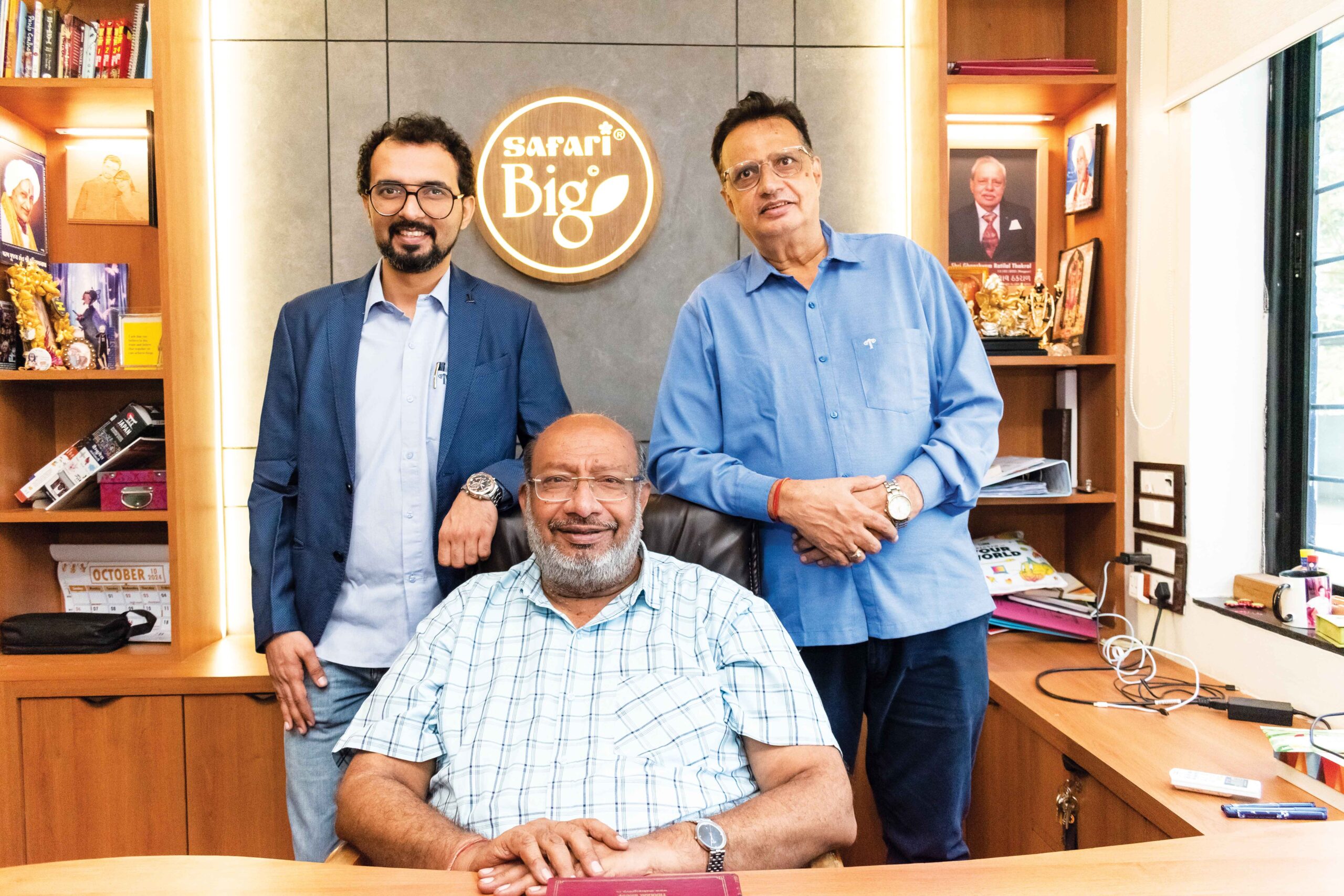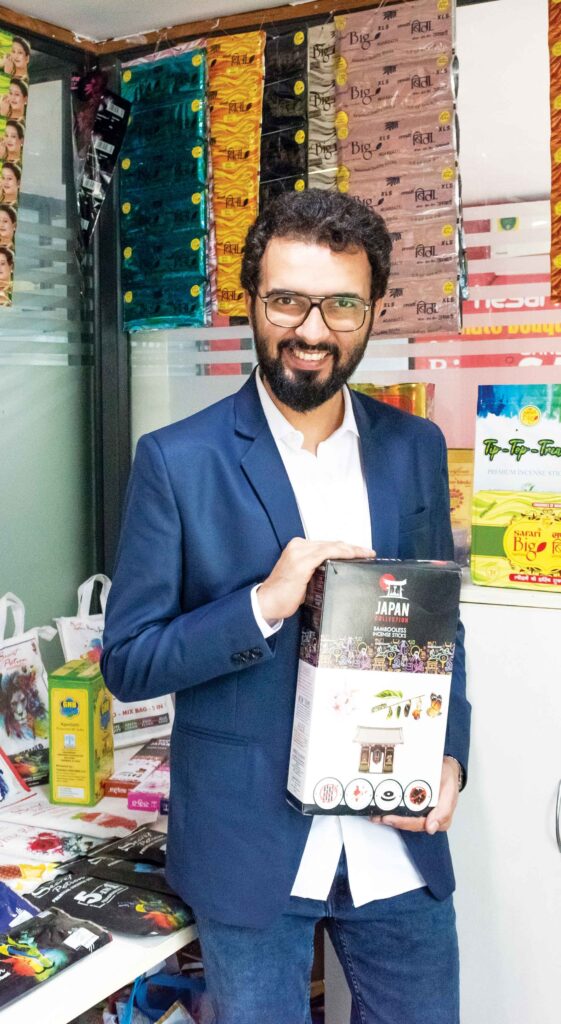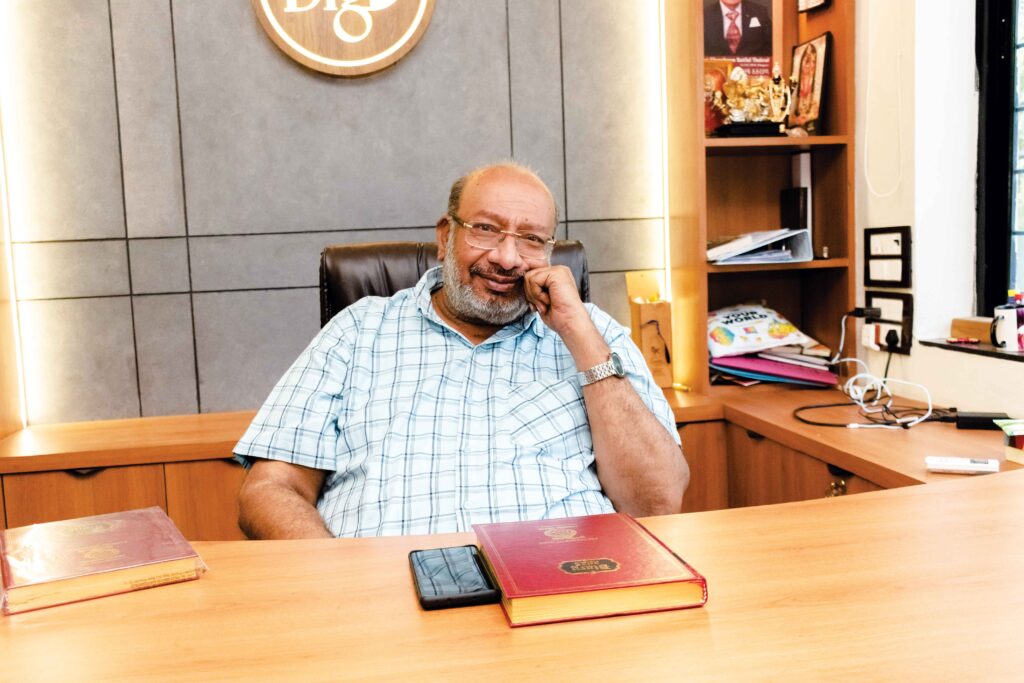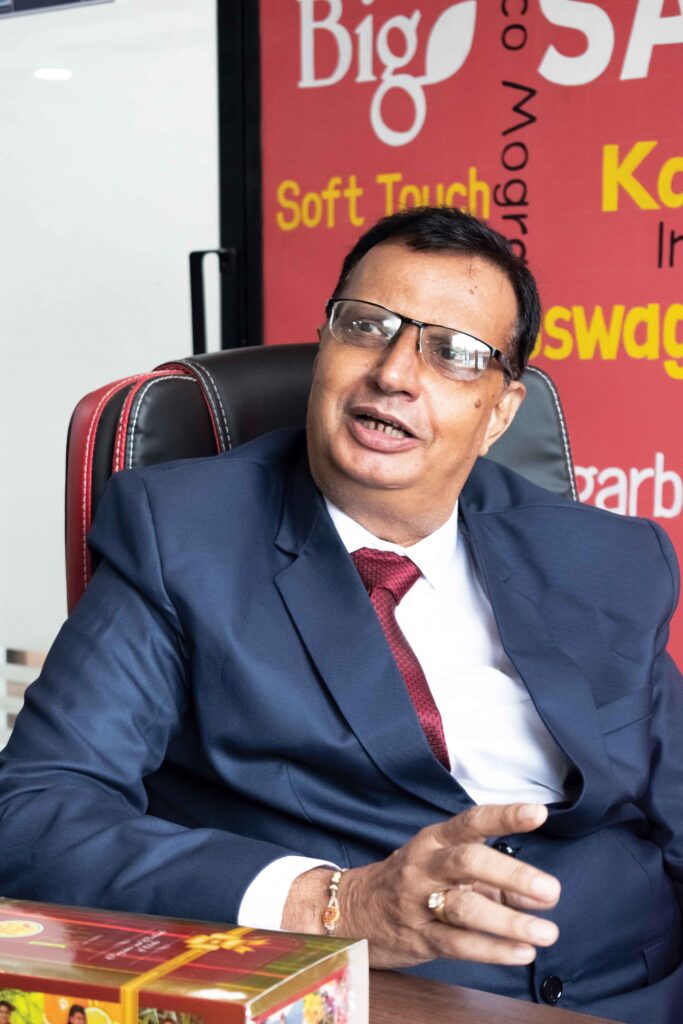
The Thakral Group: Celebrating 75 Years of Tradition, Innovation, and Growth in the Agarbatti Industry
Nagpur-based Shree SawaramAgarbattiBhandar gears up for the Diamond Jubilee of their iconic incense business, with an ambitious vision for the future.
Nagpur-based entrepreneur Mr Hasmukh Ratilal Thakral, owner of Shree SawaramAgarbattiBhandar, has announced plans to celebrate the Diamond Jubilee of their incense business next year. Operating under the ‘Safari Big’ brand since 1981, the company is part of the Thakral Group, which traces its roots back to 1951. Speaking to Sugandh India magazine, Mr Thakral revealed that he represents the fourth generation of the family business. The Thakral family relocated from Gujarat to Nagpur in 1940, where his parents began their journey in the incense industry. A decade later, his father registered their first incense brand, ‘Parasmani’. Reflecting on their business journey, Mr Thakral highlighted the steady growth of their agarbatti business. Plans are already underway to mark the 75-year milestone with special celebrations.

Expansion and Innovation: The Thakral Group’s Next Chapter
Looking ahead, Mr. Thakral stated that the company will launch new incense brands and fragrances as part of its expansion strategy. These products will feature innovative packaging, including zipper packs and boxes, and will be priced at ₹50 to attract a broader customer base. The Thakral Group’s commitment to innovation and legacy underscores its enduring position in the Indian incense industry.
Mr Thakral highlighted a significant transformation in their production process. Initially focused on traditional blending techniques, Mr Thakral introduced research and development (R&D) into the blending process, combining innovation with craftsmanship to create signature incense products. Blending, the process of mixing raw materials to achieve the desired fragrance and texture, is critical to incense production. By integrating R&D, the company has elevated this process, ensuring superior quality and unique aromatic profiles in their products. “Our R&D team continues experimenting with blending techniques, mixing and matching reserves to curate fragrances that align with market demands,” Mr Thakral explained.
Pioneering Change in Production and Logistics
He credited his younger brother, Bharat Bhai— for providing essential support and technical know-how in this innovative journey. Mr Thakral revealed that their efforts are paying off, as 24 new fragrances are nearing completion. These fragrances are undergoing final refinements and will be ready for launch by the end of the year. Starting this year, the company plans to release at least two signature agarbatti products per month, showcasing its commitment to continuous innovation and market leadership. The Thakral Group’s focus on blending tradition with modern R&D reinforces its position as a pioneer in the Indian incense industry.
Mr Thakral shared insights on evolving trends in the incense industry and the strategic expansion plans. Highlighting a novel market development, he remarked on the introduction of agarbatti-scented sprays, which offer an alternative to traditional incense sticks by delivering the same aromatic effect through a spray, similar to room fresheners. Discussing the brand’s market presence— Mr Thakral noted that Maharashtra has been its core market for over five decades. However, ShreeSawaramAgarbattiBhandar has steadily expanded its footprint into neighbouring states, including Gujarat, Madhya Pradesh, Chhattisgarh, Telangana, and Goa. Additionally, the company is strengthening its presence in emerging markets such as Bihar, Karnataka, and parts of Delhi and Punjab. Sharing his thoughts about Punjab, Mr Thakral expressed confidence that their products will reach all districts within the next decade. “We have a detailed three-year plan, and my vision is to gain access to every untapped agarbatti market across India. Our team is putting in maximum effort to achieve this goal,” he stated. With a focus on innovation and nationwide expansion, the Thakral Group is poised to capitalise on emerging opportunities and cement its leadership in the incense industry.
When asked about his approach to establishing depots outside Maharashtra, Mr Hasmukh Ratilal Thakral of ShreeSawaramAgarbattiBhandar explained that the introduction of GST (Goods and Services Tax) reshaped his logistics strategy.”While transportation within Maharashtra, such as from Nagpur to Mumbai, is manageable due to local distributors and transporters, the challenge lies in covering similar distances outside the state,” he said. Mr Thakral praised the improved logistics efficiency brought by the Samruddhi Highway (Hindu HrudaysamratBalasaheb Thackeray Maharashtra Samruddhi Mahamarg), which has significantly reduced travel time between Nagpur and Mumbai. “Earlier, it took 24 hours to transport goods over 800 kilometres; now, it takes half that time. The shorter route saves approximately 200 kilometres, cutting costs and improving delivery timelines,” he explained. Discussing Nagpur’s strategic potential, Mr Thakral highlighted its emergence as a logistics hub for industries and commerce. “Nagpur’s location is ideal, with National Highways 6, 7, and 69 intersecting here. It is also a critical junction for Asian Highways AH43 (Agra to Matara, Sri Lanka) and AH46 (Kharagpur to Dhule). Being the Zero Mile City of India further strengthens its logistical advantages,” he remarked. With these strategic benefits, Nagpur is poised to play a pivotal role in the Thakral Group’s efforts to expand its market reach and streamline its supply chain operations across India.

Diversified Product Portfolio and Sustainable Practices
Mr Thakral shared insights into their diversified product portfolio beyond agarbattis. The range includes traditional wet and dry dhoop, bamboo-less agarbattis, and dry dhoop sticks. However, he emphasised that these products primarily support his business ecosystem, with his core focus remaining on manufacturing high-quality agarbattis. Despite being in the agarbatti business for 75 years, Mr Thakral humbly remarked that it might take another 25 years to fully master the craft of creating truly “good and lovable” incense. While the comment may appear sarcastic, it reflects his humility and dedication to continuous learning in a challenging yet rewarding industry.
Highlighting the accessibility of the incense business, Mr Thakral observed, “This is such a beautiful business. One can start with just ₹25,000. Conversely, those investing crores risk significant losses if not managed wisely.” He pointed out the role of global exposure, citing the World Perfumery Congress (held in Geneva this year) as a platform where manufacturers explore cutting-edge technologies, concepts, and fragrances to bring innovation back to India. In a light-hearted conclusion, Mr Thakral praised Sugandh India magazine for its impactful work in the fragrance industry. He acknowledged the publication as one of the top three most preferred magazines in the incense domain and congratulated its team for supporting new players. “If you continue supporting risk-taking entrepreneurs evolving as incense manufacturers, it will be a win-win situation for both,” he stated. Thakral Group’s commitment to innovation, humility, and collaboration reinforces its position as a leader in the domestic incense industry.

Mr Thakral revealed their innovative approach to agarbatti manufacturing by incorporating cow dung into the production process. Explaining the rationale behind this alternative trend, he noted that cow dung has natural antibiotic properties and its smoke serves as an excellent mosquito repellent. By integrating limited amounts of cow dung into agarbattis, the final product (agarbatti) offers dual benefits: it effectively repels mosquitoes while producing a pleasant, enduring fragrance. Highlighting this innovation, Mr Thakral introduced a new product line under the brand name ‘Do Not Disturb’, marketed as a “cow dung batti” rather than explicitly as a mosquito repellent. The product has been well-received in the market, with positive feedback and repeat sales reflecting its growing popularity. “Cow dung-infused agarbattis have a bright future,” remarked Mr Thakral, underscoring the potential of this eco-friendly and health-conscious innovation in the incense industry. With initiatives like this, the Thakral Group continues to position itself as a forward-thinking player in the Indian incense market, blending tradition with sustainability to cater to evolving consumer preferences.
Overcoming Challenges and Seizing Opportunities
Mr Thakral reflected on the challenges faced by the agarbatti industry and the resilience of manufacturers during a period of upheaval. He pointed to the (government) ban on importing raw agarbattis as a significant challenge that disrupted the market. “We didn’t know what to do. Everything shut, and the two years were practically lost,” he recalled. However, he acknowledged that this disruption also proved to be a blessing in disguise, pushing the industry to adapt and innovate. “To overcome such dependencies, we changed our methods and increased production,” Mr Thakral explained. This shift resulted in numerous improvements, including the domestic availability of raw materials. Today, India holds the distinction of being the World’s largest agarbatti manufacturer, a feat made possible through advanced agarbatti-making machinery and technology that ensures efficient processing and superior product quality.
On the future of bamboo stick agarbattis— Mr Thakral noted that limited production is currently dictated by the import of bamboo from China and Vietnam. However, he expressed optimism, stating, “Once India develops quality bamboo plantations at scale, the dependency on imported bamboo will end, brightening the future of this segment.” Packaging also remains a critical challenge. Mr Thakral highlighted the difficulty of moving away from plastic packaging and lamination due to a lack of viable alternatives. His company has experimented with paper-based packaging for some products, but it remains in the trial phase. One of their recent innovations, Camouflage, is an incense product packaged in an eco-friendly, plastic-free design, which will soon be introduced to the market.
Acknowledging feedback from Sugandh India about their wooden box-packaged incense, Mr Thakral reiterated his commitment to sustainable packaging solutions. He also revealed that the company has begun producing masala agarbattis and is awaiting market feedback. Despite these challenges, Mr Thakral expressed pride in being part of an environmentally safe and adaptable industry. “Unlike cement or other large-scale industries, the agarbatti business, as an MSME, can be scaled up or down with relative ease,” he remarked. With innovations in packaging, sustainable practices, and technology, ShreeSawaramAgarbattiBhandar is poised to lead the agarbatti industry into a greener and more efficient future.
Bharat Thakral’s Vision: The Power of Innovation
Bharat Thakral, the younger brother of Mr Hasmukh Ratilal Thakral, shared his enthusiasm for the achievements of ShreeSawaramAgarbattiBhandar during discussions with Sugandh India. He expressed particular joy over the success of the Sugandh India Expo 24 held in Varanasi, a key market for the agarbatti industry. Highlighting Uttar Pradesh as a strategic region, Bharat Bhai remarked, “As the most populous state, U.P. is a hotspot for agarbatti manufacturers. Additionally, the Purvanchalregion, being the gateway to the northeast, makes it logistically significant.” The company has seen impressive sales from oriental fragrances like Oud, Chandan, and Kesar which are especially popular.
Bharat Bhai also spotlighted their flagship product, the Maha Jumbo Agarbatti, a five-foot-long incense stick known for its rich fragrance. “This product has created waves in various markets, especially in Gujarat and Maharashtra, and sold over 2,000 packets in Telangana alone,” he noted. Describing it as their USP, Bharat Bhai mentioned the steady stream of distributor queries for this product. Another standout product is the High-Class dry dhoop stick, a six-inch, slow-burning incense stick with a signature fragrance capable of filling large halls. This registered brand has been a consistent performer for three years. Japan Series, a premium incense line targeting high-end and export markets, has also received positive feedback.
Among other popular offerings are the Supreme and Big Safari series, which are best-sellers in Chhattisgarh and Maharashtra. For cost-conscious customers, 4-in-1 and 5-in-1 zipper pack agarbattis, priced at ₹100, offer a sustainable variety of quality fragrances and have been generating generous revenues nationwide. Bharat Bhai’s comments underscored their organisation’s commitment to innovation and market responsiveness, ensuring that ShreeSawaramAgarbattiBhandar remains a leader in the competitive incense industry.
Social Media and Digital Engagement
Social media has emerged as a key driver for the success of ShreeSawaramAgarbattiBhandar’s product line, according to Bharat Thakral and Samarth Thakral, who discussed its impact during a conversation with Sugandh India. Bharat Bhai highlighted the effectiveness of campaigns centred on themes like good family life, which resonate positively with users, while also boosting brand awareness and product sales. Samarth Bhai elaborated on the shifting dynamics of digital engagement. “The attention span of social media users has decreased significantly over the last five to seven years. With platforms like WhatsApp, Instagram, YouTube, and Facebook flooded with reels, stories, and short videos, the only way to engage effectively is to flash our brands repeatedly,” he explained. He noted that social influencers— play a crucial role in connecting users to their brands. To maximise reach, the company shares promotional videos with distributors, who then post them as social media statuses and share them further with local retailers and consumers. This networked sharing strategy has proven highly effective, generating up to 25–30% additional sales without incurring extra costs.
Samarth Bhai also emphasised the importance of adapting to new technologies. “With the advent of AI, content creation and user behaviour have changed dramatically. We are optimistic about keeping pace with these fast-changing technologies,” he said. By strategically leveraging social media platforms and incorporating AI-driven insights, the Thakral Group is seamlessly connecting with consumers while driving significant growth in the competitive incense market.



